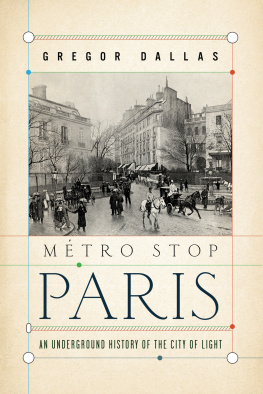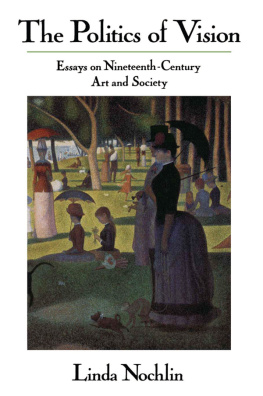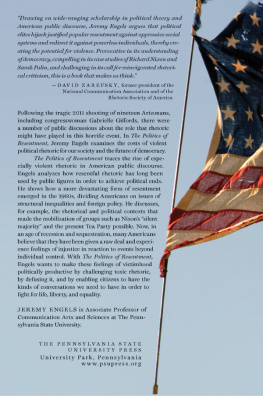Originally published in 1986 by Princeton University Press
Published 2005 by Transaction Publishers
Published 2017 by Routledge
2 Park Square, Milton Park, Abingdon, Oxon OX14 4RN
711 Third Avenue, New York, NY 10017, USA
Routledge is an imprint of the Taylor & Francis Group, an informa business
Copyright 2005 by Taylor & Francis.
All rights reserved. No part of this book may be reprinted or reproduced or utilised in any form or by any electronic, mechanical, or other means, now known or hereafter invented, including photocopying and recording, or in any information storage or retrieval system, without permission in writing from the publishers.
Notice:
Product or corporate names may be trademarks or registered trademarks, and are used only for identification and explanation without intent to infringe.
Library of Congress Catalog Number: 2005041752
Library of Congress Cataloging-in-Publication Data
Nord, Philip G., 1950-
The politics of resentment: shopkeeper protest in nineteenth-century Paris / Philip G. Nord; with a new introduction by the author.
p. cm.
Updated ed. of: Paris shopkeepers and the politics of resentment. 1986. Includes bibliographical references and index.
ISBN 1-4128-0461-2 (alk paper)
1. MerchantsFranceParisPolitical activityHistory19th century. 2. Stores, RetailFranceParisHistory19th century. 3. Paris (France) Politics and government. I. Nord, Philip G., 1950- Paris shopkeepers and the politics of resentment. II. Title.
HF5429.6F72P376 2005
| 32230944361dc22 | 2005041752 |
| CIP |
ISBN-13: 978-1-4128-0461-5 (pbk)
A BOOK is an historical artefact: the observation is no less true of this one than of others. The particular moment that framed The Politics of Resentment: Shopkeeper Protest in Nineteenth-Century Paris has passed, though not altogether, and in this measure the volume retains its immediacy, enough so, I trust, to justify a paperback edition almost twenty years after publication of the hardbound original.
The Politics of Resentment came out in 1986 at a time when social history was still much in vogue. Social history had its founding texts, none more canonical than E. P. Thompsons The Making of the English Working Class (1963). Thompson, a charismatic ex-communist who had distinguished himself as an activist in the Campaign for Nuclear Disarmament, believed in the redeeming power of popular-based social movements, a point of view which informed every page of his book. It was a perspective shared by a growing number of American colleagues who had first-hand experience themselves as social activists, whether in the labor or civil rights movements. The anti-Vietnam War activism of the late sixties and early seventies relayed such sentiments to a younger generation, and from this amalgam crystallized a powerful historiographical current that styled itself the new social history. It was leftist in inspiration, often Marxist, always progressive. Sometimes it came with a social-science veneer. There was plenty of number-crunching, but that was not mandatory. What was imperative was the study of the social struggle, of efforts from below to take charge of historys course. But who counted as below? The answer came to some degree framed in class terms. They were workers and peasants, just as Marx had written, and, indeed, the history of the working classlabor historystaked out a place for itself as the front-ranking sub-genre of the new social history. But there were other categories of subalterns with a claim to social agency, categories less easy to situate in a Marxist framework: African-Americans (enslaved and free), populist farmers, artisans, and shopkeepers.
Shopkeepers were, in fact, a subject of especial difficulty. They were numerous in the ranks of Frances revolutionary sans-culottes. Studies of the nineteenth-century crowd revealed an ongoing, though diminishing level of shopkeeper participation. Yet, these were property-owners. What were they doing in the van of progress? More complicating still, a substantial corpus of social science literature identified small owners, the petite bourgeoisie, as the social anchor of much twentieth-century right radicalism. How could a social stratum, once aligned with the left, end up at the opposite end of the political spectrum?
This was the set of problems which The Politics of Resentment took on, and it did so through close analysis of a particular shopkeepers organization, the Ligue syndicale du travail, de lindustrie et du commerce which, at its peak, numbered a membership upwards of one hundred thousand. The league got its start in 1880s Paris as a tax-protest movement aligned with the more radical wing of the parti rpublicain; it wound up at the turn of the century, disappointed and resentful, as an ally of anti-Dreyfusard nationalism. The first section of The Politics of Resentment deals with the movements origins, the second with its rightward turn. Together, the two halves constitute a social history very much of its moment, complete with maps and numerical tables. Paristhe city, its neighborhoods and economylies at the heart of the tale, but this is also social history with a difference. The neighborhoods are not working class so much as commercial, and the tone is far from celebratory, for the story told is not about the forward march of labor but about the rise of a new, anti-Semitic right which would find its ultimate expression in fascism.
The social history moment has now long passed. Labor historians, once legion, count no more than a handful today. How is such a historiographical sea change to be accounted for? A social historical explanation might run as follows.
The manufacturing base of the worlds core economiesmining, metals, textileshas shrunk and continues to shrink. Service and high-tech industries have moved into the space opened by heavy industrys decline. The result has been a massive upheaval in the labor market. Once stable working-class communities have come under intense pressure, undermined by outsourcing, plant closures, and structural unemployment. At the same time, the tertiary sectors rapid expansion has multiplied jobs for the unskilled and, in the office world, for the semiskilled. The construction of a new workforce has been a painful process. The pinched and uncertain circumstances of the 1970s and 1980s, combined with the opportunities opened by the womens liberation movement, pushed and pulled women into the labor market in huge numbers. The disintegration of certain Third World economies fed a wave of immigration to the core, which has been sucked into low-skill employment. From the 1930s through the 1960s, it was possible to conjure an image of the typical American or European worker: bare-chested, hard-hat-ted, and male. Is it still possible to do so today?
Since the Thatcher/Reagan eighties, the politics of the industrial core have turned in part on how to negotiate an economic transition of such vast proportions. Neo-liberalism has turned out the winning policy. In practice, this has meant a concerted effort to speed the mobility of money, knowledge, and, most important of all, labor. Since the turn of the century, labor and its allies had pieced together a scaffolding of institutions and policies to protect working people: trade unions, regulatory bodies, the welfare state. These were tarred as obstacles to the economic retooling essential to survival in a competitive world market and subjected to an intensive assault forms reeling. Social democrats, from Mitterrand, to Blair, to Schroeder, have backed away from the










